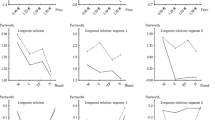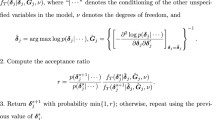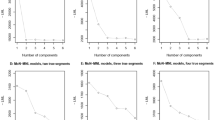Abstract
Integrated choice and latent variable (ICLV) model incorporates latent factors into standard discrete choice model with aim to provide greater explanatory power. Using simulated datasets, this study makes a comparison among three estimation approaches corresponding to the sequential approach and two simultaneous approaches including the maximum simulated likelihood with GHK estimator and maximum approximate composite marginal likelihood (MACML) approach, to evaluate their abilities to recover the underlying parameters of multinomial probit-kernel ICLV model. The results show that both simultaneous approaches outperform the sequential approach in terms of estimates accuracy and efficiency irrespective of the sample sizes, and the MACML approach is the most preferable due to its best performance on recovering true values of parameters with relatively small standard errors, especially when the sample size is large enough.


Similar content being viewed by others
References
Ashok, K., Dillon, W.R., Yuan, S.: Extending discrete choice models to incorporate attitudinal and other latent variables. J. Market. Res. 39, 31–46 (2002)
Börsch-Supan, A., Hajivassiliou, V.A.: Smooth unbiased multivariate probability simulators for maximum likelihood estimation of limited dependent variable models. J. Econ. 58(3), 347–368 (1993)
Bahamonde-Birke, F., de Dios Ortúzar, J.: Is sequential estimation a suitable second best for estimation of hybrid choice models? Transp. Res. Rec. 2429(1), 51–58 (2014). doi:10.3141/2429-06
Ben-Akiva, M., McFadden, D., Gärling, T., Gopinath, D., Walker, J., Bolduc, D., Börsch-Supan, A., Delquié, P., Larichev, O., Morikawa, T.: Extended framework for modeling choice behavior. Market. Lett. 10(3), 187–203 (1999)
Ben-Akiva, M., McFadden, D., Train, K., Walker, J., Bhat, C.R., Bierlaire, M., Bolduc, D., Boersch-Supan, A., Brownstone, D., Bunch, D.S.: Hybrid choice models: progress and challenges. Market. Lett. 13(3):163–175 (2002)
Bhat, C.R.: Quasi-random maximum simulated likelihood estimation of the mixed multinomial logit model. Transp. Res. Part B 35(7), 677–693 (2001). doi:10.1016/S0191-2615(00)00014-X
Bhat, C.R.: The maximum approximate composite marginal likelihood (MACML) estimation of multinomial probit-based unordered response choice models. Transp. Res. Part B 45(7), 923–939 (2011). doi:10.1016/j.trb.2011.04.005
Bhat, C.R., Dubey, S.K.: A new estimation approach to integrate latent psychological constructs in choice modeling. Transp. Res. Part B 67, 68–85 (2014). doi:10.1016/j.trb.2014.04.011
Bhat, C.R., Sidharthan, R.: A simulation evaluation of the maximum approximate composite marginal likelihood (MACML) estimator for mixed multinomial probit models. Transp. Res. Part B 45(7), 940–953 (2011)
Bolduc, D., Ben-Akiva, M., Walker, J., Michaud, A.: Hybrid choice models with logit kernel: applicability to large scale models. In: Lee-Gosselin, M., Doherty, S. (eds) Integrated land-use and transportation models: behavioral foundations, pp 275–302. New York, Elsevier (2005)
Bolduc, D., Alvarez-Daziano, R.: On estimation of hybrid choice models. In: Choice modelling: the state-of-the-art and the state-of-practice, Proceedings from the Inaugural International Choice Modelling Conference, p 259. Emerald Group Publishing (2010)
Bollen Kenneth, A.: Structural equations with latent variables. Wiley, New York (1989)
Cappellari. L., Jenkins. S.P.: Calculation of multivariate normal probabilities by simulation, with applications to maximum simulated likelihood estimation. Stata J. 6(2), 156–189 (2006)
Cherchi, E., de Dios, Ortúzar J.: Empirical identification in the mixed logit model: analysing the effect of data richness. Netw. Spat. Econ. 8(2–3), 109–124 (2008). doi:10.1007/s11067-007-9045-4
Daziano, R., Bolduc, D.: Covariance, identification, and finite-sample performance of the MSL and Bayes estimators of a logit model with latent attributes. Transportation 40(3), 647–670 (2013). doi:10.1007/s11116-012-9434-5
Daziano, R.A.: A Bayesian approach to Hybrid Choice models. Dissertation, Université Laval (2010)
Ferdous, N.: A new estimation approach for modeling activity-travel behavior: applications of the composite marginal likelihood approach in modeling multidimensional choices. Dissertation, The University of Texas at Austin (2011)
Geweke, J.: Efficient simulation from the multivariate normal and student-t distributions subject to linear constraints and the evaluation of constraint probabilities. In: Computing science and statistics, Proceedings of the 23rd symposium on the interface, pp. 571–578. Citeseer (1991)
Geweke, J., Keane, M., Runkle, D.: Alternative computational approaches to inference in the multinomial probit model. Rev. Econ. Stat. 76(4), 609–632 (1994). doi:10.2307/2109766
Gibson, F.L., Burton, M.: Biased estimates in discrete choice models: the appropriate inclusion of psychometric data into the valuation of recycled wastewater. In: 53rd Australian Agricultural and Resource Economics Society Conference in Cairns, Australia, pp 11–13. (2009)
Hajivassiliou, V.A., McFadden, D.L.: The method of simulated scores for the estimation of LDV models. Econometrica. 66(4), 863–896 (1998). doi:10.2307/2999576
Keane, M.P.: Four essays in empirical macro and labor economics. Brown University, Providence (1990)
Keane, M.P.: A computationally practical simulation estimator for panel data. Econometrica 62, 95–116 (1994)
Kitrinou, E., Polydoropoulou, A., Bolduc, D.: Development of integrated choice and latent variable (ICLV) models for the residential relocation decision in island areas. Choice 41(43), 45 (2010)
McFadden, D.: The choice theory approach to market research. Market. Sci. 5(4), 275–297 (1986)
Murphy, K.M., Topel, R.H.: Estimation and inference in two-step econometric models. J. Bus. Econ. Stat. 3(4), 370–379 (1985)
Paulssen, M., Temme, D., Vij, A., Walker, J.L.: Values, attitudes and travel behavior: a hierarchical latent variable mixed logit model of travel mode choice. Transportation 41, 873–888 (2013)
Raveau, S., Álvarez-Daziano, R., Yáñez, M., Bolduc, D., Ortúzar, J.D.D.: Sequential and simultaneous estimation of hybrid discrete choice models. Transp Res Rec 2156(1), 131–139 (2010). doi:10.3141/2156-15
Raveau, S., Yáñez, M.F., Ortúzar, JdD: Practical and empirical identifiability of hybrid discrete choice models. Transp. Res. Part B 46(10), 1374–1383 (2012). doi:10.1016/j.trb.2012.06.006
Tam, M.L., Lam, W.H.K., Lo, H.P.: Incorporating passenger perceived service quality in airport ground access mode choice model. Transportmetrica 6(1), 3–17 (2009). doi:10.1080/18128600902929583
Temme, D., Paulssen, M., Dannewald, T.: Incorporating latent variables into discrete choice models—a simultaneous estimation approach using SEM Software. Bus Res 1(2), 220–237 (2008). doi:10.1007/BF03343535
Train, K.: (2009) Discrete choice methods with simulation. Cambridge university press
Vredin Johansson, M., Heldt, T., Johansson, P.: The effects of attitudes and personality traits on mode choice. Transp. Res. Part A 40(6), 507–525 (2006)
Walker, J., Ben-Akiva, M.: Generalized random utility model. Math. Soc. Sci. 43(3), 303–343 (2002)
Williams, H.C.W.L., Ortuzar, J.D.: Behavioural theories of dispersion and the mis-specification of travel demand models. Transp. Res. Part B 16(3), 167–219 (1982). doi:10.1016/0191-2615(82)90024-8
Yanez, M.F., Raveau, S., Ortúzar, JdD: Inclusion of latent variables in Mixed Logit models: modelling and forecasting. Transp. Res. Part A 44(9), 744–753 (2010)
Acknowledgments
This research is sponsored by the National Natural Science Foundation of China (No.51278301). The authors would like to express their appreciation to anyone who has provided suggestions and comments on this paper.
Author information
Authors and Affiliations
Corresponding author
Rights and permissions
About this article
Cite this article
Fu, X., Juan, Z. Estimation of multinomial probit-kernel integrated choice and latent variable model: comparison on one sequential and two simultaneous approaches. Transportation 44, 91–116 (2017). https://doi.org/10.1007/s11116-015-9626-x
Published:
Issue Date:
DOI: https://doi.org/10.1007/s11116-015-9626-x




